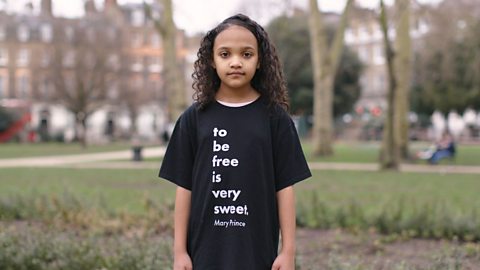LORE:Hi, I'm Lore and I'm 12 years old. In the UK, special honours such as MBE, OBE and CBE are given to recognise people's amazing achievements and service to the country. MBE stands for Member of the Order of the British Empire. While an MBE is a great honour, its connections with the British Empire means not everyone feels comfortable accepting. For hundreds of years, Britain built an empire, taking over and ruling many places all over the world, including large areas of Australia, America, New Zealand, Asia and Africa. I'm on my way to meet Eunice who, like me, is a second generation Nigerian whose family settled in Scotland.
EUNICE:Hi! Come in.
LORE:What was it like growing up for you?
EUNICE:My family ended up in Scotland because my dad became part of the British Navy. After my dad stopped working in the Navy, my mum decided to stay in Scotland, so she moved to Wester Hailes. And Wester Hailes is kind of like a typical working class council estate. Where I grew up there wasn't anybody that looked like me at all. And in a lot of ways, I was probably the first black person that a lot of people had met. So it was a bit difficult because I did kind of get picked on a lot because of the colour of my skin. But I was really lucky because my mum was amazing and she believed in me and she taught me that it's so important to love yourself. So things started to change around about the age of 15 for me. I was scouted by a model agent. I was coming from a background where I had had really bad experiences because of the colour of my skin. Actually, people thought that I looked great, or I looked amazing, which to me was so unusual and so strange, and it built my confidence so much.
LORE:What opportunities did modeling give you?
EUNICE:It was a means for me to go and see completely different places and people. This one is a magazine in Scotland, and it was the first ever time that they had a black girl on the cover.
LORE:
Wow!
EUNICE:In 2017, I was awarded an MBE for my contributions to arts, broadcasting and charity work. When I first found out about the MBE, I was so overwhelmed. I could not believe it. And then I was kind of confused because it didn't suit what I stand for. I don't agree with the Empire and some of the things that they were involved in, such as the slave trade. So for me, I wasn't sure if I wanted to be part of that. I went to my family and I asked my mum and she talked to me about the sacrifices that her generation made. She talked to me about the sacrifices of generations before her. And she talked to me about legacy. But in the end, what I decided to do was to accept the MBE, but to donate it to the National Museum of Scotland. And I decided to donate it there so that everybody, school kids, adults, anybody that went to the museum could see it. And also, most importantly, because I wanted people to discuss Empire and to discuss how much the past affects the future and what we can all do to move forward in a way that helps everybody and is fair to everybody.
LORE:Speaking with Eunice has really made me appreciate all the work she has done to help others and how her career has contributed togreater diversity by seeing black people in TV, film and fashion. It really makes me feel proud to see other Nigerians do such amazing work, and it makes me feel even more proud of my Nigerian roots. I hope that all of Eunice's hard work helps young people like me want to do better as well, but also not to be held back because of the colour of our skin.
Video summary
In this short film 12-year-old Lore meets Eunice Olumide, a second generation Nigerian who was born and grew up in Scotland and become a professional model.
Lore, also with Nigerian roots, questions Eunice on what life was like growing up in Scotland in the only black family within the local community.
The film then follows Euniceãs story as she talks about overcoming her issues with identity and breaking into the modelling world.
The films touches on a number of different issues including the British Empireãs involvement in the transatlantic slave trade.
This short film is from the ôÕÑ¿¿ìë½òæØ°àŠ¢Ö Teach series, Black British Stories.
Teacher Notes
Before watching the film
You may want to introduce the pupils to these different awards and how and why they are chosen and presented:
- MBE (member of the order of the British Empire)
- OBE (officer of the order of the British Empire)
- CBE (commander of the order of the British Empire)
- KBE/DBE (knight or dame commander of the order of the British Empire)
- GBE (knight or dame grand cross of the order of the British Empire)Do your pupils know of any famous people or people from their local community who have been awarded any of these awards? Are awards and rewards important? Think about how rewards / awards / incentives are given in your school. How does it make you feel on receiving / not receiving a reward / an award?
You may also wish to discuss the British Empire and its involvement in the transatlantic slave trade. However, please note that teaching of the British Empire is a key discussion point in education currently and that your school may have a particular policy or approach. Some teachers prefer to teach pre-slavery content (for example, African kingdoms), before lessons on empire and colonisation.
Pupils may also want to consider what impacts the way they feel about themselves and their identity and confidence. You could note here that Eunice is a black women who grew up in Scotland, and has a Scottish accent. This could create a deeper understanding and connection for pupils who may have experienced discrimination due to their language, accent or dialect. It might open up broader discussions on identity, culture and the multiple influences that create our sense of self and identity.
Please note that discussions should be treated with sensitivity. Pupils may find Euniceãs story upsetting ã perhaps they are one of only a few black children in their community, or perhaps (like Eunice), they have been discriminated against because of the colour of their skin. Pupils may wish to discuss their experiences (both positive and negative), as a result of watching this film. Individuals in the class should not feel any expectation to discuss their own circumstances, although they may choose to.
The direction of this discussion might lead to white pupils being curious and asking about touching hair. This should be treated with sensitivity. Does your school have a policy on hair discrimination? This Newsround video provides further insight.
Questions to consider
Depending on the focus of your lesson, you may wish to pause this short film at certain points to check for understanding, asking questions such as:
- What does beauty mean to you? Is beauty always on the inside / outside / both / or none of these?
- How do you think it might have felt being the only black child in the school or local community?
- Why do you think there were no pictures of black people in the history books or on television as Eunice was growing up? Is this still the case? In the film Eunice talks about being the first black women on the cover of a particular magazine in Scotland.
- Do you think there are more white people than people of colour on our televisions and in magazines now?
- How do you think it felt for Eunice, being told she was thought of as beautiful by the modelling agency?
- Why do you think it was such a struggle to be associated with the British Empire for Eunice?
- Why was it important for her to accept the award in the end?
- Why do you think she decided to give the award to the National Museum of Scotland rather than keep it?
Activities to further explore learning
Exploring the history of the slave trade and the British EmpirePupils could research the part the British Empire played in the slave trade and when it was eventually made illegal. They could write a letter in role as William Wilberforce, trying to persuade parliament in 1806 to abolish the slave trade and make it illegal.
The story of an artefactLook at the story of the MBE being exhibited in the National Museum of Scotland. Pupils could explore the idea of artefacts and where they come from and the story they each tell. They could write the story of Euniceãs MBE. Pupils could visit museums that are local to them and see if they have any exhibits donated which tell a personal story like Euniceãs.
Exploring identityPupils can explore their own identity and look at their roots and what makes up their identity. They could paint their portrait and find images to reflect their identity and paint these, or stick them behind their portrait to create a mixed media piece of work. Please note, this activity should be approached sensitivitly with your cohort (children may be looked-after or not know much about their roots).
Self respect and confidencePupils can be challenged to explore what they like about themselves and what personal strengths they think they have. Pupils can create a picture dividing a silhouette of themselves into sections and writing what they like about themselves.
School awardPupils could design a school award or badge to acknowledge their school's commitment to anti-racist practice. This could instill pupils with a real sense of pride.
Community fashionYou could invite pupils to bring in and/or 'parade' fashion items that mean something to them and their community.
Key Vocabulary
- Archiving - documenting and preserving public records, historical papers and artefacts.
- Civil rights - The rights of all citizens to equality.
- Culture - A pattern of behaviour shared by a society, or group of people.
- Discrimination - The unjust or prejudicial treatment of different categories of people.
- Diversity - Differences in racial and ethnic, socioeconomic, geographic, and academic backgrounds.
- Empire - Lands or regions that are controlled by one ruler or government.
- Equality - When people are treated the same, regardless of what they look like or where they come from.
- Forced migration - When people are made to leave their home or homeland.
- Immigrant - A person who comes to a country to take up permanent residence.
- Immigration - The process of moving to a new country, with plans to live there permanently.
- Legacy - Something we inherit from past generations and pass to our future generations.
- Prejudice - A preconceived opinion that is not based on reason or actual experience.
- Second generation - Children of parents who moved to a different county.
- Racism - The belief that people of different races or ethnic groups have different value in society, and using this against them.
This short film is suitable for teaching KS2 / 2nd level pupils and links to various areas of the curriculum including to history (black history, the British Empire and the slave trade) and personal, social and relationships education (diversity and identity).
Diversity and self respectBeing the only black person growing up had its challenges, and Eunice grew up often being told she was ugly. She had to overcome these challenges and form her own belief in herself and her identity.
Artefacts and where they originate fromThis short film raises questions about museum artefacts and the different stories behind each one, the journey they had to end up in the museum and artefact repatriation.
British values
This short film raises questions about the involvement the British Empire had in the slave trade and what the Empire stood for. Issues such as ãwhat British values are today and how have they changedã could be explored.
Mac Williams - Working in the coal mining industry. video
In this short film Abiodun MacDonald Williams, known to his close friends as Mac, talks to his neighbour, 11-year-old Iris, about what it was like working as a ventilation officer in County Durham in the 1960s.
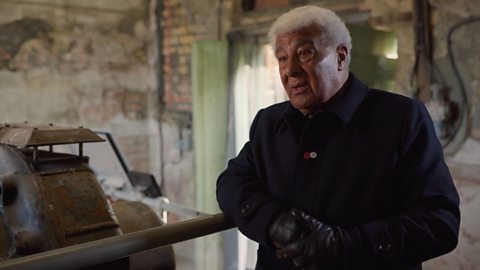
Alison Bennison - Working as a NHS nurse. video
This short film for primary schools follows Alison Bennison's journey to Britain from Barbados in 1960, to train as a nurse and work for the National Health Service. The story is told by Alison's granddaughter, Lindsey, and nine-year-old Dontay.
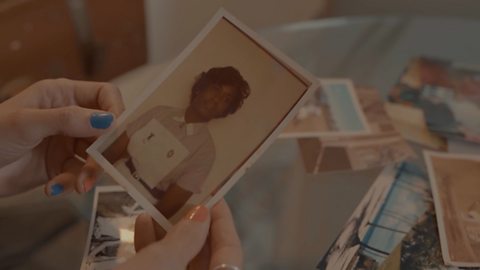
Christina Shingler - Becoming an author of children's literature. video
In this short film Felix, aged 10, talks to his grandmother Christina (Tina) Shingler, a writer who decided to do something about the lack of black characters in British literature.
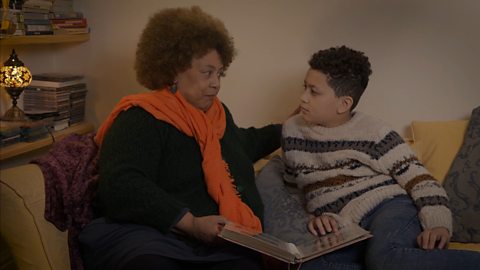
David Mwanaka - Becoming a farmer in Britain. video
In this short film 11-year-old Anashe meets David Mwanaka, and finds out about his journey from Zimbabwe to becoming a farmer in Britain.
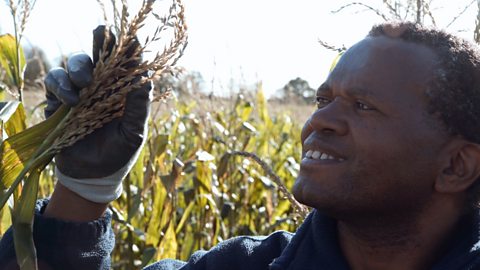
Dennis Morris - Becoming a photographer. video
This short film tells the story of Dennis Morris, a well-known photographer from London, originally from Jamaica, who photographed famous musicians including Bob Marley.
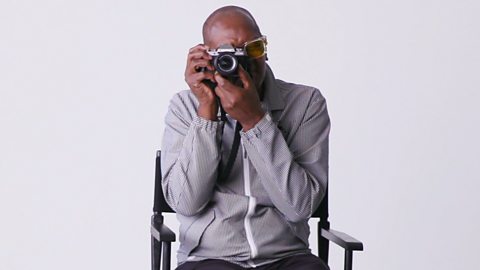
Elsie Owusu - Becoming an architect in Britain. video
In this short film 11-year-old Kendra meets Elsie Owusu, who moved from Ghana to the UK as a child and became an architect, and dealt with the challenges of working in a white, male-dominated profession.
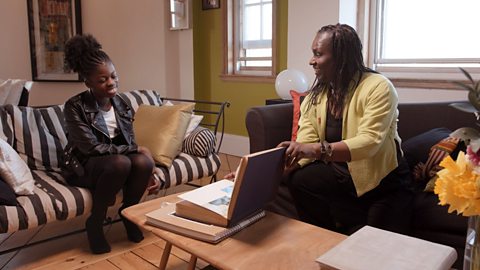
Magid Magid - Becoming the youngest ever Lord Mayor of Sheffield. video
In this short film 14-year-old Abdirahman meets Magid Magid, a Somali-British activist and politician who served as the youngest ever Lord Mayor of Sheffield from May 2018 - May 2019.
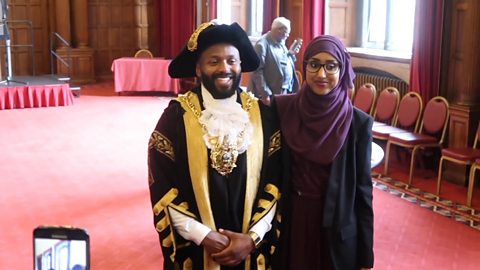
Vernon Samuels - The Bristol Bus Boycott of 1963. video
In this short film 13-year-old Amelia and Vernon Samuels, who represented Great Britain in the 1988 Olympics, tell the story of the Bristol Bus Boycott and Vernon's father, who was the first black bus driver in Bristol.
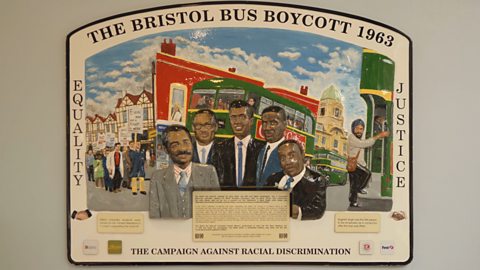
Yesha Townsend - A Bermudian poet in London. video
This short film tells the story of Yesha Townsend, a Bermudian poet who currently lives and works in London, and how she has been influenced by Mary Prince, a black woman who escaped from slavery.
